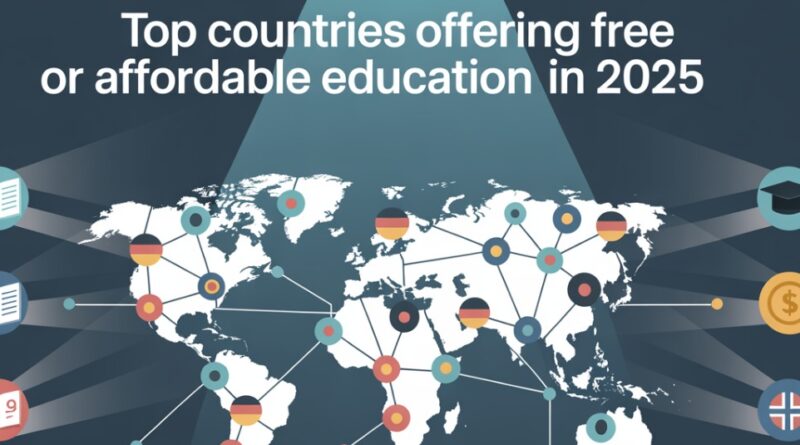Top Countries Offering Free or Affordable Education in 2025
Introduction
Dreaming of studying abroad without breaking the bank? You’re not alone. In 2025, students are more determined than ever to chase quality education without the burden of massive loans. And guess what? Several countries are stepping up to make that dream a reality. Whether it’s free tuition, subsidized programs, or generous scholarships, the world is opening doors wider for global learners like you.
🎓 Benefits of Studying Abroad with Free or Low Tuition
🌐 Exposure to Diverse Cultures
Learning in a new environment lets you build global friendships, experience new traditions, and broaden your worldview—education isn’t just about books!
💸 Financial Relief and Less Student Debt
Let’s face it—student loans are stressful. Free or low-tuition education lets you graduate without being chained to debt for decades.
🚀 Better Career Opportunities
🔍 Key Factors to Consider When Choosing a Country
🗣 Language Barrier
Some countries offer free education but only in their native language. Think: Czech in the Czech Republic or German in Germany.
🛂 Visa Regulations
Always check student visa rules—some countries are friendlier than others when it comes to working while studying.
🏠 Living Costs
Tuition may be free, but cities like Oslo or Paris can be pricey. Scholarships or part-time jobs can help bridge the gap.
💼 Work Opportunities for Students
Some countries allow students to work during their studies or offer post-study work visas. Huge plus!
🌟 Top Countries Offering Free or Affordable Education in 2025
🇩🇪 Germany – The Pioneer of Tuition-Free Education

Germany has long been the gold standard for zero tuition fees, especially in public universities like TU Munich and University of Heidelberg.
Living Cost Tip: Average €850/month. Look for DAAD scholarships to ease expenses.
🇳🇴 Norway – Free Education for All
Yes, you read that right—free education even for non-EU students!
Heads-up: Living in Norway is pricey. Plan for around €1000/month for housing and food.
🇫🇮 Finland – Innovative Education System
While Finland charges non-EU students, scholarships often cover full tuition.
Bonus: Post-study work permits make staying back easy.
🇦🇹 Austria – Low-Cost Education in the Heart of Europe
Public universities charge about €1,500/year for international students.
Language Tip: Some programs are German-only, but many master’s programs are in English.
🇨🇿 Czech Republic – Study for Free in Czech
Education is 100% free in public universities if you study in Czech. English programs have small fees (~€1,000/year).
Pro Tip: Enroll in a year-long Czech language prep course.
🇫🇷 France – High-Quality Education with Nominal Fees
Public university tuition is under €400/year for most programs.
Living Help: France offers housing aid for students—CAF can cut your rent in half!
🇸🇪 Sweden – Scholarships and Top-Notch Programs
Non-EU students pay tuition, but scholarships are generous and cover tuition + living expenses.
Study Focus: Sustainability, design, and tech programs are top-tier.
🇵🇱 Poland – Quality Education at Budget-Friendly Prices
English-taught programs with fees as low as €2,000/year.
Cost of Living: €300-500/month. A solid deal for students.
🇲🇽 Mexico – Affordable and Culturally Rich
Many public universities charge minimal fees or are completely free.
Culture Shock? In the best way! Expect vibrant traditions, food, and music.
🇧🇷 Brazil – No Tuition at Public Universities
Public institutions offer tuition-free programs, though Portuguese is usually required.
Tip: Many offer free language courses to international students.
🇦🇷 Argentina – Free Education for All Nationalities
Foreign students can attend public universities tuition-free!
Highlight: The University of Buenos Aires is globally ranked—and totally free.
🏅 Honorable Mentions
🇸🇮 Slovenia
Low-cost tuition and a beautiful, peaceful environment.
🇬🇷 Greece
Nominal fees and rich history—perfect for culture lovers.
🇭🇺 Hungary
Affordable and increasingly popular among international students.
🎓 Scholarships and Funding Opportunities
🎯 Erasmus+
Covers tuition, travel, and living costs in EU countries.
🎯 DAAD (Germany)
Covers everything from tuition to monthly living costs.
🎯 Eiffel Excellence Scholarship (France)
Fully funded master’s and PhD programs.
🎯 Fulbright (USA – Partial Tuition)
Prestigious, but often doesn’t cover full costs.
🎯 Nordic Scholarships
Available in Sweden, Norway, Finland—often covers full tuition + stipend.
📝 Tips for Applying to Free or Affordable Universities
- Start Early: Some deadlines are 8-12 months in advance.
- Document Checklist: Passport, transcripts, CV, recommendation letters, etc.
- Write a Killer Motivation Letter: Be authentic and passionate.
- Understand Visa Rules: Know how many hours you can work and if post-study visas are available.
❌ Common Myths About Free Education Abroad
- “It’s low quality” – Nope. Many top-ranking schools are free.
- “Only locals get in” – International students are encouraged!
- “It’s impossible to be accepted” – With the right prep, you’ve got this.
✅ Conclusion
In 2025, the doors to global education are wider than ever before. From Europe to Latin America, countries are showing that education is a right—not a privilege. Whether you’re aiming for a tuition-free degree or a low-cost education with scholarship support, your future is bright and globally open.
It’s time to explore your options, prepare your documents, and take that leap. Because the world is waiting for students like you.
❓ FAQs
1. Can I work while studying in these countries?
Yes, most countries allow international students to work part-time. Always check the specific visa regulations.
2. Are there age limits for free education?
Not usually. Some scholarships might have age criteria, but most public universities do not.
3. Do I need to speak the local language?
Depends on the country and program. Some require local language (like Czech), others offer full English programs.
4. Are these degrees recognized worldwide?
Absolutely! Degrees from countries like Germany, France, and Sweden are globally respected.
5. How early should I apply for 2025 intakes?
Start at least 12 months in advance to prepare documents, apply for scholarships, and secure a visa.



